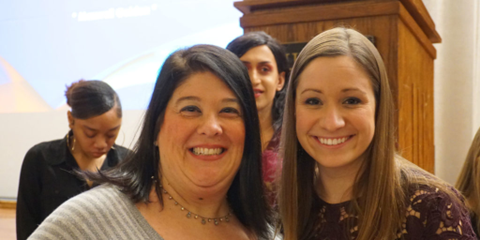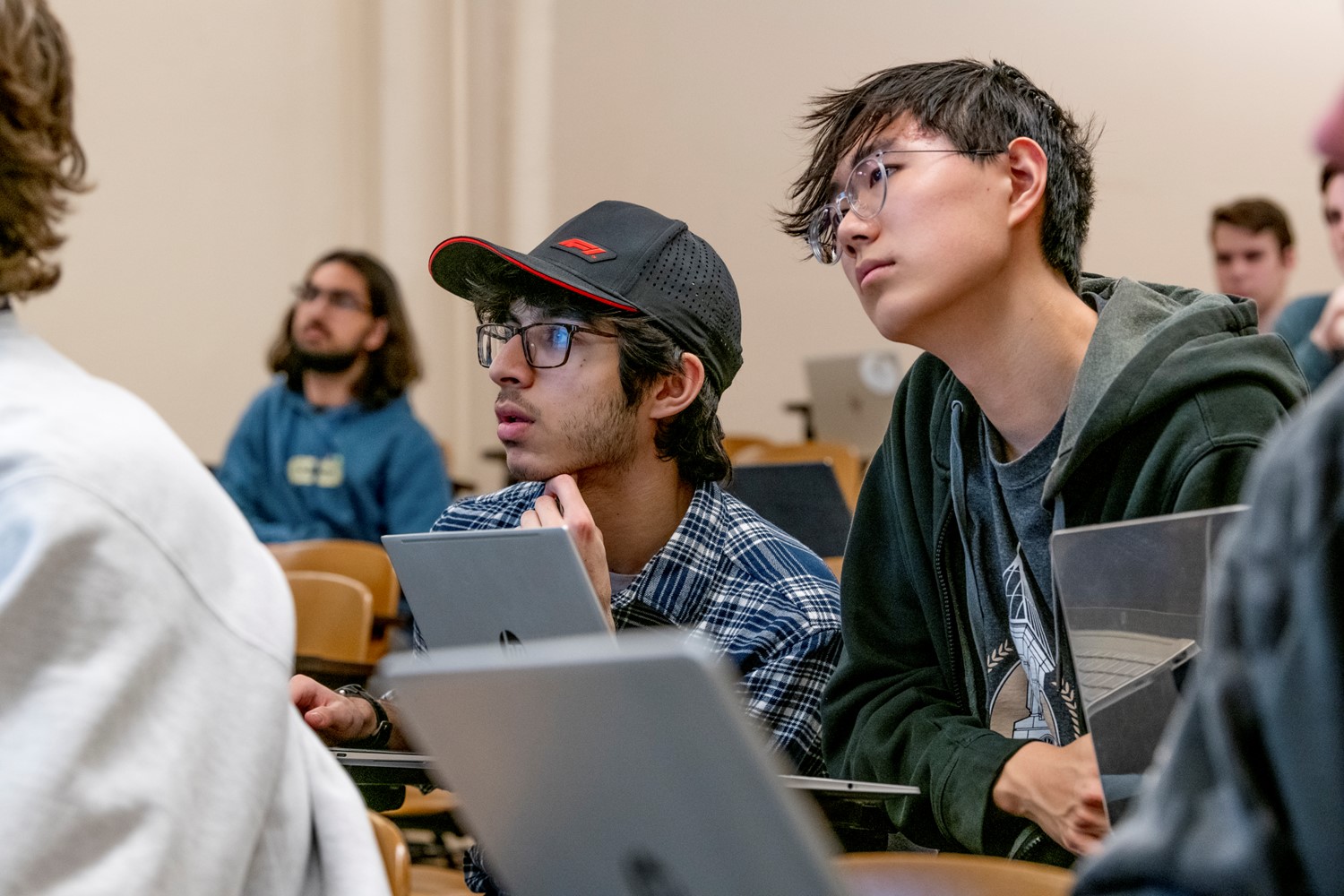
Purdue students who fall below a 2.0 grade point average will no longer be “on academic probation” – instead, they’ll be “on academic notice,” thanks to a change in academic regulations language recently approved by Purdue’s University Senate.
The new language, effective in the fall of 2023, also includes the term “separation for academics” instead of the previously used “dropped for academic deficiency.” More than 90 percent of the Senate voted to pass the language change during its February meeting.
Zenephia Evans, associate dean of students for education and advocacy, co-authored the proposal for the language change, along with Heather Dykes, director of student success for Purdue’s College of Health and Human Sciences. Dykes says she hopes the language change will help counter misconceptions about why students struggle academically.

Pictured: Heather Dykes, Director of Student Success for HHS, and Stacy Gudas (Consumer Science, ’15)
“People often mistakenly assume students are just not cutting it, that they should change their major because the classes are too hard, or they’re not studying enough, or they’re playing too many video games,” Dykes says. “Then, when you get surveys back from students about what’s happening in their life, you learn that a student’s parent was diagnosed with cancer, or their grandparent who raised them has severe dementia and they’re going home every weekend because they want to spend time with them, or they’re experiencing extreme financial instability.”

Pictured: Zenephia Evans, associate dean of students for education and advocacy
Evans, who does phone outreach to students who are on probation for the third time, says the word “probation” is loaded with stigma and associations with the criminal justice system. The words “dropped for academic deficiency” can impact a student’s sense of belonging and their perceived ability to thrive at Purdue, she adds.
“Academic struggles are almost always situational and should not be labeled as a personal deficit,” Evans says. “That word, ‘deficiency,’ takes something out of you, which then takes a while to gather and put back. We don’t send a message of support for students when we say, ‘You were good – we admitted you. Now you’re deficient.’
Collaborating to support student success
It was October of 2021, smack dab in the middle of the COVID-19 pandemic, and Jeff Elliott had just joined Purdue as executive director of University Undergraduate Academic Advising.
He quickly became part of the Probation Team, a cross-unit working group that had been meeting about academic probation-related issues since the pandemic began. The group included representatives from the Helen Bass Williams Academic Success Center (ASC), Office of the Dean of Students, Summer Programs, and Teaching and Learning.
The group, which included Evans and Dykes, already had several projects underway when Elliott joined. They’d been reviewing scholarly references related to probation and dismissal best practices. They also surveyed students who had been on probation at least once during their course of study at Purdue.

Pictured: Jeff Elliott (right) joins advising staff at an ’All Aboard Purdue’ event in 2022.
“We were talking as a group about the value of failure, and about how failure is not necessarily a negative experience,” Elliott says. “Especially at an institution so heavily embedded in STEM, we want to help students adopt a growth mindset. You try, and you may fall short, but that doesn’t matter; what matters is how you react after.”
Another of the team’s initiatives involved reviewing letters and email communications received by students on probation from various campus offices. The goal was to revise the letters with more psychologically attuned and growth mindset language that would also mirror the University’s academic regulations.
The problem was that some of the regulatory language hadn’t been updated since the ’90s, and pieces of it were the opposite of supportive.
“I remember one point in our conversation, there was a sense of, ‘Well, this is a decision that would have to be made by Purdue’s Educational Policy Committee, so we don’t have control over it,’” says Heather Servaty-Seib, associate vice provost for Teaching and Learning. “And yet, it’s quite possible for staff to work together and create a draft document offering possible academic regulation changes.”
Like Dykes, Servaty-Seib hopes the change in terminology will help the campus community conceptualize students’ academic struggles in a different light – she underscores that it isn’t about students’ academic potential, but about what’s happening in their lives in a broader way.
“This change is guided by evidence, not just at the national level, but from our own campus; language makes a difference,” Servaty-Seib says. “It’s part of a culture, and it may not be the sweeping change that happens overnight, but it shifts the tone and the interpretation of the experience.”

Pictured: Students sit with laptops out in class, looking forward to their instructor
A shift in how Purdue demonstrates care
As director of Purdue’s Helen Bass Williams Academic Success Center, Katie Dufault emails students whose GPA is less than a 2.0 with weekly, timely, and supportive messages. The communication campaign is another outcome from the team’s work.
Dufault’s first email opens with a note of encouragement. It reads, in part:

Pictured: Katie Dufault, Director of the Academic Success Center
“Purdue admits students who have what it takes to be successful. Each semester, my colleagues and I see students meet their academic goals, whether it be to improve their GPA, return to good standing, or mastering content that once seemed too difficult. We believe in you and your potential.”
Dufault, who has been part of the probation working group since the beginning, says she hopes reframing the language in this way will demonstrate a level of care and support, rather than the messages coming across as punitive or shameful. She also hopes the revised language will encourage students as they take the next steps to get back in good academic standing.
“In the past, when I’ve introduced messages to students on academic probation, I’ve received so many responses from students trying to justify themselves, trying to prove themselves, expressing so much shame and embarrassment,” Dufault says. “They’re trying to tell me that they think they do deserve to be at Purdue. We’re really focused on how these simple shifts can help students focus on what they need to do, so they can take the next steps toward taking care of themselves holistically, and academics will follow.”

Andrea Mattingly
Director of Communication, Student Success Programs, andrea@purdue.edu

